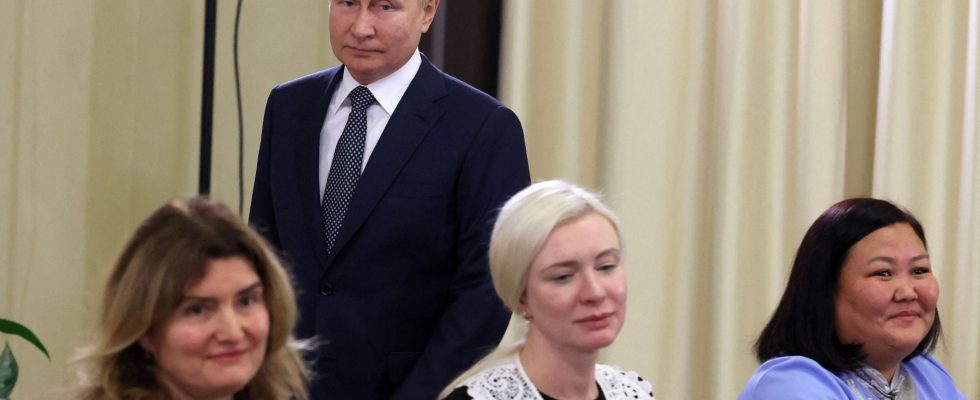“Let them shut their charming mouths.” In Russia, like Elena Penzina, MP for the Krasnoyarsk region, the authorities are exasperated by the demands of some wives of Russian soldiers mobilized in Ukraine – a population that is generally committed to the Kremlin’s cause. Having planned to gather in the city of Kemerovo, in Siberia, on November 15, to demand the return of their sons and husbands from the front, they came up against the Russian power machine, intransigent towards the slightest criticism of the “special military operation”.
Currently, more than 300,000 men are deployed on the front lines in Ukraine, but unlike soldiers engaged in private militias and former detainees recruited in prison, they do not know their contract end date, and will not “return home until ‘after the completion of the special military operation’, said Andrei Kartapalov, chairman of the Duma Defense Committeeon September 15.
“The way back”
For thousands of women, this announcement sounds like an injustice against their “honest men” who left to “defend the homeland”. Because they did not avoid the mobilization decreed in September 2022, unlike hundreds of thousands of others who left Russia.
From this feeling of abandonment was born on Telegram, the Russians’ favorite social network, the channel “Pout Domoï” (“The path home”, in Russian), in September 2023. Followed by more than 13,000 people, it crystallizes the demands of these women who do not feel listened to. “We, parents and friends of the mobilized soldiers, […] we want a decent life for ALL citizens of our country!”, insists their manifesto published on November 12, and which fights for the demobilization of soldiers.
The long struggle of mothers and wives of soldiers
“The movements of mothers of Russian soldiers were created from the end of the 1980s, with the war in Afghanistan then the wars in Chechnya, recalls Anna Colin Lebedev, sociologist specializing in post-Soviet societies and author of the book The political heart of mothers. Analysis of the movement of soldiers’ mothers in Russia (2013). They have always campaigned for respect for the rights of soldiers, especially those of young conscripted men.”
It is in this tradition that, after a year of mobilization in Ukraine, the movement of soldiers’ wives for their return is part. But tired of challenging local deputies and regional governors, a minority of them are moving up a gear. On November 7 in Moscow, some demonstrated for the first time, and dozens of groups formed in different regions on Telegram to simultaneously organize rallies throughout the country on November 19. Only one could take place, in Novosibirsk. The others were all canceled under the pretext of the Covid-19 epidemic. An excuse mocked on the Telegram network, where distrust of the authorities is growing. “Covid, Covid, we’ve had enough. It’s just that no one cares about this war,” grumbles Lyoubov, on a Telegram group from Saint Petersburg.
Anti-war voices
However, women are careful not to directly criticize the war, and remain in a legalistic approach. “In their public discourse, they play the card of loyalty, a strategy which has always paid off in obtaining what they want from the authorities,” explains Anna Colin Lebedev. The administrators of “Pout Domoï” make it clear every day: “we do not want to play at ‘rocking the boat’ and destabilizing the political situation.”
Despite everything, tongues are loosened. Among the messages scrolling through the groups, a few anti-war voices dare to speak out, and ignite the conversations on Telegram. “Only stopping the war will bring back the husbands”, writing a member. “You should demand an end to hostilities,” says another.
The responses to these comments are incendiary, accusing their authors of being “Ukrainian agents” or “navalnysts” (in reference to the imprisoned opponent Alexeï Navalny), the height of insult in Putin’s Russia. “Our despair has been exploited by vultures, deplores Olga Katz, one of the women most committed to the return of those mobilized and whose brother is a soldier. These are people who don’t care about our pain, but want to carry out a coup in the country.”
Presidential election
For the Kremlin, it doesn’t matter that the vast majority of these women are on its side: the authorities see their approach as an unforgivable criticism of the military command. On November 15, at least 5 women from Krasnoyarsk were pressured by the authorities, forcing them to show their smartphones to check if they belonged to the “Pout Domoï” channels. reports Russian independent media Important Stories.
As the presidential election approaches in Russia, the authorities intend to prevent such movements from developing. “The Kremlin can ban these movements, as it has already done this year for some, or flood them with money to obtain their silence,” underlines Anna Colin-Lebedev.
The demobilization of soldiers is clearly not happening right away. “The regime fears the moment when they will return,” explains the researcher, because they will reveal their traumatic experience in broad daylight. In the meantime, on Telegram or other social networks, soldiers’ wives continue to express their distress. Until when ?
.
